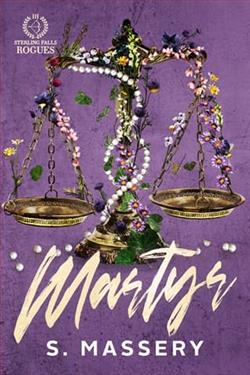Page 6 of Cruelly Fated
“Oh, Mom…what should I do?” I collapsed to my knees. “Grandpa wasn’t supposed to betray us.” Yet, he had. No matter how I cross-examined his behavior, he had delivered the deepest cut yet. I wiped away tears with my sleeve, my mind sharpening.
Visiting my mom’s grave always brings me peace and clarity. I’d sell the house—the place I had called home since I could remember—to pay for a new housing situation closer to the art institute.
Grandpa would disapprove initially, but he owed me. He would sign the papers. I sniffled, aware that my decision might devastate him. Oh hell, I might not even go through with it once I see him. As much as I wanted to scream into his face, I had too much love and respect for the foolish man. Hurting himwas like hurting myself. And fae gods knew I’d endured enough punishment already.
I had been saving money since I was fifteen, never spending a dime except for art supplies so that I wouldn’t burden my mom. She’d been doing so much for me and Grandpa already. And then Mom passed away, and I took over groceries and bills but still managed to save. The house was paid off, and I earned decent tips when I flirted with patrons.
Now, the house felt too large for just me. When Grandpa was released, I’d hopefully have a decent job and stability that would allow him to stay with me. The thought of sending him to a public elderly home was unbearable.
I blinked rapidly, stopping oncoming tears. Then chuckled at how erratic I’d been. I couldn’t fall apart now, when mine and Grandpa’s future depended on me alone.
The lone flower I’d planted months ago was leaning heavily to one side as if an animal stomped over it. I propped it up and rearranged course soil around it.
I had no idea what the next few years might bring. But I needed to move forward with my plan to leave this cursed district. And selling the house seemed like the only viable option.
I kissed the pads of my fingers and pressed them onto the tombstone. “Thank you, Mom,” I whispered.
Four
ALLIE
Pull yourself together.
I waited outside the prison’s visitor entrance, every instinct screaming at me to turn and run. My stomach churned, nerves coiling tighter with each step closer to the buzzing doors. All morning, I’d swung between sobbing fits—grieving for Mom, then aching for Grandpa Pete—and white-hot rage over what he’d done.You better have a damn good explanation forthis, Grandpa.
My eyes burned again. I shoved on my sunglasses to keep the tears in and the world out.
The front entrance slid open. Family members of other inmates formed a single line, their anxious expressions mirroring mine. I trailed behind, in silence, while a steady beat of a ball pounding the ground sounded nearby. I squinted at the prison fencing and glimpsed inmates sprinting after a basketball.
As I entered the building, I shut my eyes for a moment and drew in a deep breath. Then another. Trying to calm the galloping rhythm of my heart.
A harsh buzz cracked through the air as the magnetic lock engaged, and the door closed behind me. A tremor shot through me, rattling my bones.
Four days. It had only been four days since his arrest that awful Sunday morning, yet it felt like a lifetime.
Officer Marley had pulled every string to get me on the earliest family visitation list. Every day, questions about Grandpa plagued me, ate at my soul. What if he wasn’t okay? What if they hadn’t fed him? What if…what if he didn’t look like himself anymore?
I passed through the metal detector, filled out a visitation form, and handed it to a stone-faced guard with my ID. He disappeared into the back and returned a moment later with a name sticker, instructing me to press it above my chest where all the guards could see it. I did as told, trying to keep my hands from shaking. Once they processed everyone, the guards herdedus down a narrow corridor like a cattle. Was that how they treated Grandpa, too? Like he didn’t matter?
“Marsh, room four. Marsh, room four,” the intercom crackled with my family name. My knees wobbled, threatening to buckle. I shuffled my feet down the line of numbered doors until I reached number four. A guard met me there, his gaze sweeping over me, and lingering on my bare legs.
I had work after this—first shift back since the club’s three-day closure—so I wore what Larry expected: denim shorts that hugged high over the curve of my thighs and a fitted tank top with a tear along my cleavage line. I tapped my foot, my pulse skipping with each second. The guard smirked, then punched in a code. With a hiss of air, the pressurized lock released, and the door groaned open.
I blinked hard, barely recognizing the man on the other side of the thick glass. His shaggy salt-and-pepper hair hung in uneven clumps, and his beard looked weeks past trimmed. One eye was sunken and shadowed with a dark, purplish bruise; the other avoided mine. His lips were cracked, and blood stained corners of his mouth. He swallowed and looked down, shame cutting a line across his face deeper than any wound.
I sank onto the cold plastic visitor stool, my breath hitching. “Fae gods…” The words barely made it out. “Is that a cut on your lip?”
His tongue flicked out, brushing the mark, a slight, unconscious movement that confirmed everything I feared. I’d heard the stories—this was the most brutal prison in Avari, a placewhere violent shifters and hardened fae were locked away. But I never imagined this. Not for him.
“Who did this to you, Grandpa?” My voice cracked. “Tell me. I’ll file a complaint and raise hell if I have to. They need to move you—”
“Shh, child,” he rasped, voice gravelly and hollow. “If you need to blame someone, blame me.”
“No…” I whispered. My hands curled into fists. “No matter what you did, you don’t deserve this. You gambled, that’s all. For the love of the fae gods, why would they send you here for that?”
My outrage surged hot and fast. I almost stood, ready to storm out and demand to speak to someone—anyone. But then I caught the way Grandpa winced as he shifted in his seat. My heart clenched, and I pressed my weight back into the chair. He looked thinner too, and it had only been four days.
And what could I do, really? We were the low fae of Avari. We didn’t carry influence. We didn’t get second chances. That was why the other inmates could beat him and walk away laughing. Because in their eyes—and the system’s—he was no one worth protecting.















